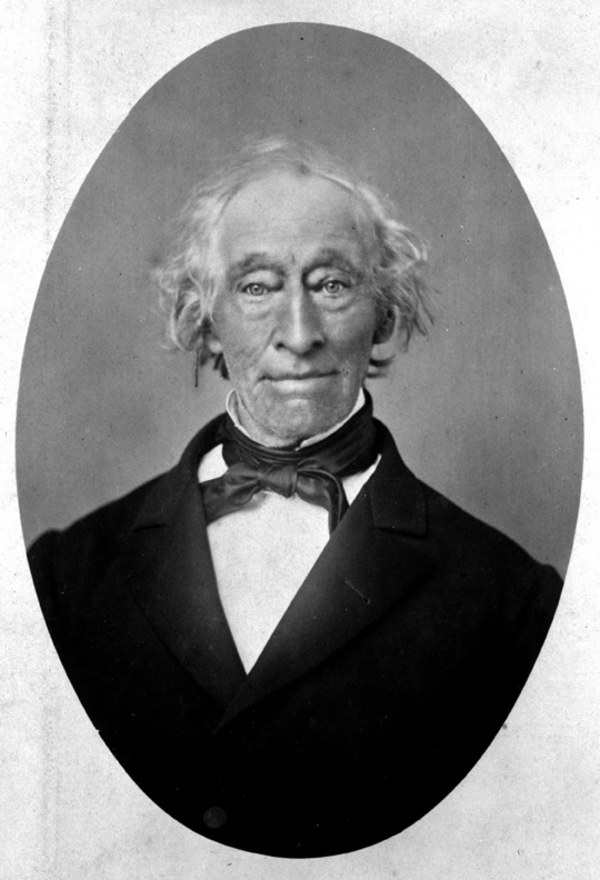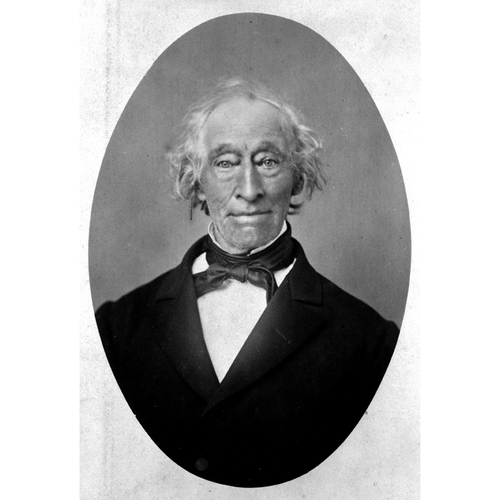
Source: Link
TOD, JOHN, HBC chief trader; b. in October 1794 in the Loch Lomond area of Dunbartonshire, Scotland; d. 31 Aug. 1882 at Victoria, B.C.
John Tod was the son of a clerk in the cotton-printing industry, and after a village school education he worked in a cotton warehouse in Glasgow. In 1811 he joined the Hudson’s Bay Company and sailed with other apprentices from Stornoway to York Factory (Man.) in the chartered ship Edward and Ann. From 1811 to 1817 Tod was stationed in the Severn District in the vicinity of Hudson Bay. He was at Trout Lake (N.W.T.) in 1814 when he was promoted clerk; the following year he was placed in charge of Severn House. In 1818 he was posted to the Island Lake District (Man.), remaining there until the end of outfit 1822–23.
Tod was posted to the New Caledonia District in 1823 and made the long overland journey from York Factory to McLeod Lake on the west side of the Rockies that same year. With Chief Factor John Stuart* in charge, the party included Tod’s fellow officers Donald McKenzie* Jr and Samuel Black*, as well as the usual complement of oarsmen and other servants. The crossing was made by way of Île-à-la-Crosse (Sask.) and the Athabasca and Peace rivers; McLeod Lake was reached after three months’ travel.
Tod joined James Murray Yale* at Fort George (Prince George, B.C.) on the Fraser River, spending a year with him before settling at Fort McLeod. (James Douglas* served with him there for the winter and spring of 1825–26.) During the nine years at Fort McLeod, Tod found time to read the many good books he discovered there. He also enjoyed the companionship of “the singing girl,” “without whom life in such a wretched place . . . would be altogether insupportable.”
Having “experienced much privation in New Caledonia which . . . injured his health,” Tod was recalled to Nelson River in the York Factory District where in 1834 he received his commission as chief trader and was granted a year’s leave of absence. He sailed for England from Hudson Bay in the company’s vessel Prince Rupert and on the voyage he met Miss Eliza Waugh, a governess from the Red River District. Shortly after reaching England they were married.
Returning to Rupert’s Land by way of New York and Canada early in 1835, the Tods apparently spent the 1835–36 season in the Red River District awaiting a posting. They then moved to Island Lake where Tod took charge of the post in 1836–37. By 1837 Eliza had suffered a mental breakdown and Tod was obliged to take her to relatives in Wales. When he returned to North America he was again posted to New Caledonia and travelled to Fort Vancouver (Vancouver, Wash.) in the autumn of 1838 in charge of the annual brigade. Crossing the mountains by a more southerly route than that taken in 1823, Tod and the brigade started from Norway House (Man.) and travelled by way of the Saskatchewan and Athabasca rivers to Jasper House (Alta). They reached the Big Bend of the Columbia River on horseback, and then travelled by boat to forts Colvile (Colville, Wash.) and Vancouver. Before proceeding to Fort Alexandria (Alexandria, B.C.) on the Fraser River on the border of the Cariboo country, Tod spent a profitable time at the company’s farm in the fertile Cowlitz valley.
From 1839 to 1842 Tod served at Fort Alexandria, moving temporarily to Thompson’s River Post (Kamloops) after the murder of Samuel Black in 1841. In August 1842 Tod took formal charge of that post. Under his supervision new buildings on the west bank of the Thompson River were completed and the old fort was abandoned.
In 1849 Tod obtained a leave of absence on account of ill health and moved to Fort Nisqually on Puget Sound; while there he substituted for Chief Trader William Fraser Tolmie. Later that same year he crossed Juan de Fuca Strait to Fort Victoria and selected 100 acres of land at Oak Bay for a farm. On furlough from 1850 to 1852, Tod officially retired from the company on 1 June 1852 and settled at Oak Bay. On 27 Aug. 1851 Governor Richard Blanshard* had nominated James Douglas, James Cooper*, and John Tod to the Legislative Council of Vancouver Island. All three took the oath of allegiance and their seats at its first session three days later. Tod served until his resignation in October 1858.
Although Tod’s immediate superiors considered him “an excellent Trader” and “a very highly meritorious Officer,” he did not progress in his HBC career beyond the rank of chief trader, possibly because he did not find favour with Governor Sir George Simpson*. Simpson admitted that Tod had “claims to promotion” because he was “a good Trader and expresses himself well by Letter.” In addition, early in his career, he had established good relations with the Indians. However, Simpson felt that Tod was “not generally liked.” Tod’s dismissal of postmaster Andrew Wilson in 1833 on a charge of drunkenness that was later proved unfounded may have caused resentment.
In character Tod was a rough diamond, unconventional and radical. Thomas Simpson described him as a man “of excellent principle, but vulgar manners.” Yet he was well read and able to play the flute as well as the fiddle. His appreciation of nature and his powers of observation are demonstrated in his letters as well as in his “Career of a Scotch boy,” where he reveals himself as a good raconteur. In his correspondence with his friend Edward Ermatinger*, Tod unfolds his love of family, his hopes, his disappointments, and his moral and religious convictions. Towards the end of a long life he became a spiritualist.
Tod’s family life was possibly more unconventional than that of most fur-traders. His first country wife was Catherine Birstone in the York Factory area and they had a son, James, about 1818, and there was “the girl who used to sing at McLeod’s Lake” who bore him at least one daughter. Emmeline, who became the wife of William Henry Newton, was the only child of his marriage to Eliza Waugh. He and Sophia Lolo of Thompson’s River Post, thought to be the daughter of Jean-Baptiste Lolo*, had seven children. John and Sophia were not formally married until 1863, news of Eliza’s death in 1857 having been much delayed in reaching Victoria.
The house that Tod built in 1851 on his farm at Oak Bay has been designated a heritage house. A creek, a rock, an inlet, and a mountain all commemorate his name.
John Tod’s reminiscences were published as “Career of a Scotch boy,” ed. Madge Wolfenden, BCHQ, 18 (1954): 133–238.
Anglican Church of Canada, Diocese of British Columbia Arch. (Victoria), Christ Church Cathedral (Victoria), Parish registers, Baptisms, 1836–86; Marriages, 1837–72 (mfm. at PABC). Bancroft Library, Univ. of California (Berkeley), John Tod, “History of New Caledonia and the northwest coast” (transcript at PABC). PABC, Fort Kamloops journal, August 1841–December 1843; J. S. Helmcken, “Reminiscences” (5v., typescript, 1892); Malcolm McLeod coil., R. S. Miles to John McLeod, 2 Oct. 1837; John Tod, “Reminiscences of 1821” (copy); Vancouver Island, Colonial Secretary, Marriage licenses, 1 June 1859–22 Jan. 1867. PAC, MG 19, A2, ser.2, 5 (copy at PABC). PAM, HBCA, A.1/6; A.1/60; A.6/23; A.10/60; A.34/2; B.239/a/6; C.1/285; C.1/915; C.1/925; E.4/la (transcripts at PABC). The Hargrave correspondence, 1821–1843, ed. G. P. de T. Glazebrook (Toronto, 1938). [John McLoughlin], The letters of John McLoughlin from Fort Vancouver to the governor and committee, [1825–46], ed. E. E. Rich and intro. W. K. Lamb (3v., London, 1941–44), I–II. Minutes of Council, Northern Department of Rupert Land, 1821–31, ed. R. H. Fleming (Toronto, 1940). “The Nisqually journal,” ed. V. J. Farrar, Washington Hist. Quarterly (Seattle), 10 (1919): 205–30; 11 (1920): 59–65, 136–49, 218–29, 294–302. Alexander Simpson, The life and travels of Thomas Simpson, the Arctic discoverer (London, 1845). Vancouver Island, Council, Minutes . . . commencing August 30th, 1851, and terminating with the prorogation of the House of Assembly, February 6th, 1861 (Victoria, 1918). Daily British Colonist (Victoria), 1 Sept. 1882. Victoria Daily Standard, 2, 5 Sept. 1882. H. H. Bancroft, Literary industries (San Francisco, 1890). A.-G. Morice, The history of the northern interior of British Columbia, formerly New Caledonia, 1660 to 1880 (Toronto, 1904).
Cite This Article
Madge Wolfenden, “TOD, JOHN,” in Dictionary of Canadian Biography, vol. 11, University of Toronto/Université Laval, 2003–, accessed December 31, 2025, https://www.biographi.ca/en/bio/tod_john_11E.html.
The citation above shows the format for footnotes and endnotes according to the Chicago manual of style (16th edition). Information to be used in other citation formats:
| Permalink: | https://www.biographi.ca/en/bio/tod_john_11E.html |
| Author of Article: | Madge Wolfenden |
| Title of Article: | TOD, JOHN |
| Publication Name: | Dictionary of Canadian Biography, vol. 11 |
| Publisher: | University of Toronto/Université Laval |
| Year of publication: | 1982 |
| Year of revision: | 1982 |
| Access Date: | December 31, 2025 |



